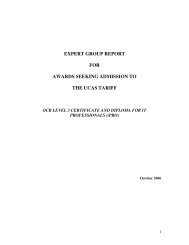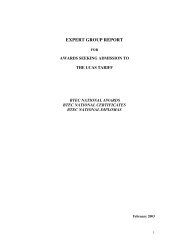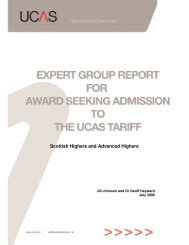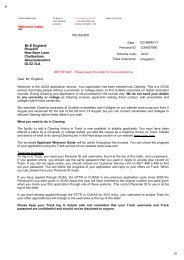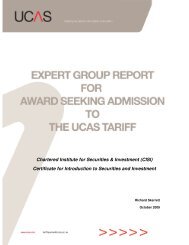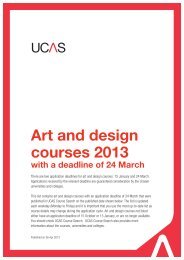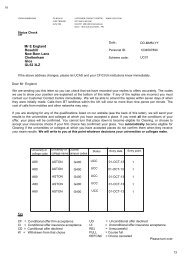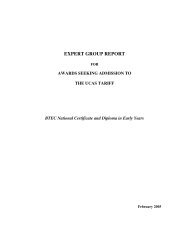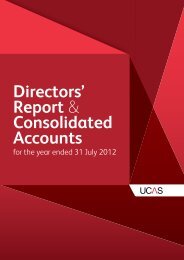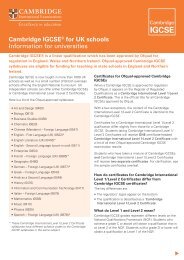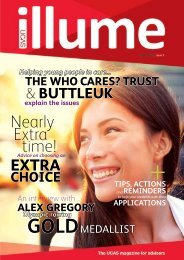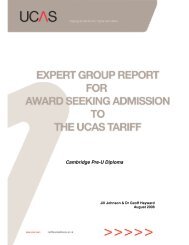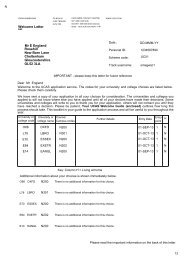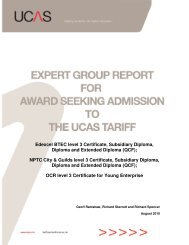International qualifications 2013 (pdf) - CUKAS
International qualifications 2013 (pdf) - CUKAS
International qualifications 2013 (pdf) - CUKAS
Create successful ePaper yourself
Turn your PDF publications into a flip-book with our unique Google optimized e-Paper software.
Qualifications currently offered<br />
ACCESS TO HIGHER EDUCATION<br />
Minimum entrance requirements to first degree courses in<br />
Tanzania are:<br />
CSE (or equivalent), with passes in five appropriate subjects<br />
obtained prior to the sitting of the ACSE (or equivalent) and two<br />
principal level passes in appropriate subjects at the same sitting,<br />
with total points not below 5, based on the scale A=5, B=4, C=3,<br />
D=2, E=1, F=0; or<br />
two principal level passes (in appropriate subjects) not at the<br />
same sitting, provided they are both of grade C or above; or an<br />
appropriate equivalent Diploma/Certificate of not less than second<br />
class/credit level and approved by the Senate.<br />
Thailand<br />
EVALUATION<br />
Mathayom Suksa 6 (M6)<br />
Mathayom 6 is the final examination taken by students at the end<br />
of their three years of upper secondary education and is<br />
acceptable at grade 1 or better in lieu of GCSE on a subject for<br />
subject basis, except in English language. It would need to be<br />
supplemented by GCE A levels, Scottish Highers or Advanced<br />
Highers, or a bridging course, as well as an appropriate English<br />
qualification.<br />
GRADING SYSTEM<br />
4 excellent<br />
3 good<br />
2 fair<br />
1 pass<br />
0 fail<br />
EDUCATION SYSTEM<br />
The system has been going through two reforms in the last five<br />
years – basically the first nine years of education to Mathayom 3<br />
are compulsory. The last three years of the upper secondary level<br />
to M6 is divided between academic or vocational routes. For the<br />
academic route, students choose either an arts or science<br />
stream, and in either stream, choose three to five specialised<br />
subjects.<br />
There is a new emphasis on vocational <strong>qualifications</strong>, which<br />
students can use to enter the workforce or continue to HE.<br />
ACCESS TO HIGHER EDUCATION<br />
Beginning in academic year 2006, students completing grade 12<br />
are obliged to take national educational tests of two types:<br />
the Ordinary National Educational Test (O-NET) and the Advanced<br />
National Educational Test (A-NET).<br />
Both examinations are administered by the National Institute of<br />
Educational Testing Service to assess student proficiency in<br />
mathematics, Thai language, science, English language and<br />
social studies, religion and culture. The A-NET tests focus more<br />
on thinking and analytical skills, as well as aptitude in relation to<br />
particular academic and professional disciplines, such as<br />
engineering, teacher education, medicine, architecture, foreign<br />
languages, fine arts, and music.<br />
The newly-modified university admission system can be<br />
summarised as follows:<br />
For admission to some fields of study, the Direct Admission<br />
System may also include O-NET and/or A-NET results. Aptitude<br />
tests not included in the national tests but required for certain<br />
fields of study will be administered by the particular institution.<br />
2) The Central University Admission System:<br />
The Office of the Higher Education Commission, the Council of<br />
University Presidents of Thailand, and the educational institutions<br />
change in the previous approach with a new Central University<br />
Admission System (CUAS).<br />
Redesigned and implemented in 2006, the revised CUAS<br />
integrates multiple indicators to evaluate student achievement<br />
and performance. These include:<br />
1) the overall cumulative grade point average (GPAX) for<br />
grades<br />
2) the grade point average (GPA) in grades 10-12 in three to<br />
five of the eight subject groups of the core curriculum<br />
3) results of the O-NET and/or A-NET tests.<br />
3) Special Programmes and the Quota System<br />
Apart from the normal admission system, a number of students<br />
are also admitted through special programmes and a quota<br />
arrangement set by the institution. For example, in cooperation<br />
with the Ministry of Public Health, the faculties of medicine at<br />
Chulalongkorn, Chiang Mai, Khon Kaen, Mahidol and Prince of<br />
Songkla universities admit about 15 per cent of their students<br />
through the 'Promotion of Medical Science Education for Rural<br />
Areas' Project.<br />
Tunisia<br />
EVALUATION<br />
Baccalauréat<br />
Acceptable as a group qualification satisfying general entrance<br />
requirements provided that an overall grade of at least ‘assez<br />
bien’ has been achieved.<br />
GRADING SYSTEM<br />
20 – 16 très bien (very good)<br />
15 – 14 bien (good)<br />
13 – 12 assez bien (fair)<br />
11 – 10 passable (pass)<br />
9 – 0 insuffisant (fail)<br />
EDUCATION SYSTEM<br />
Nine years of compulsory basic education (école de base) may be<br />
followed by four years of more advanced and specialised study<br />
leading to the Baccalauréat examinations. For the final three-year<br />
period, a choice is made to specialise in lettres, sciences<br />
mathématiques, mathématiques techniques, sciences<br />
experimentales or sciences economiques. The medium of<br />
instruction is Arabic for literature and human sciences, while<br />
French is used for scientific subjects.<br />
ACCESS TO HIGHER EDUCATION<br />
The Baccalauréat is the basis of admission to a first degree in<br />
Tunisia. Arabic and French are the media of instruction at<br />
university level.<br />
1) The Direct University Admission System:<br />
Under this system, each higher education institution determines<br />
and administers its own admission criteria and procedures in<br />
certain fields of study consistent with its mission and philosophy.<br />
60 INTERNATIONAL QUALIFICATIONS



